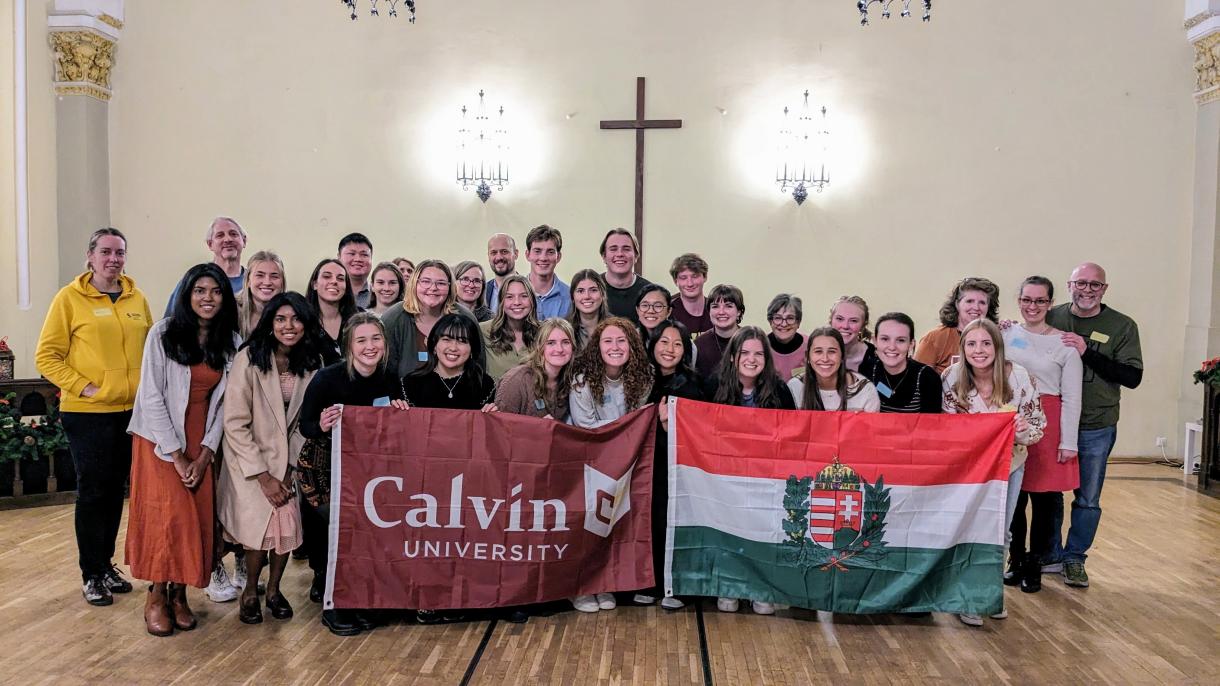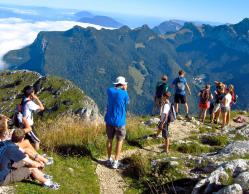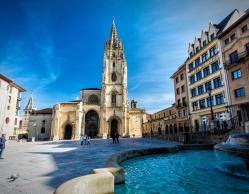Ride trams with views of the Danube river and one of the world’s largest and most beautiful Parliaments, and enjoy the city’s amazing bridges connecting historic Buda with modern Pest. Enjoy food and music festivals on weekends, majestic views from Gellert or Castle Hill, and the architectural wonder of St. Stephen’s Basilica. Eat authentic Hungarian goulash at the enormous Great Market Hall, or buy your own fresh paprika to season your homemade stew you cook with friends in your shared dorm kitchen. Ride the Eye of Budapest Ferris wheel, or walk the Grand Boulevard and tour the Museum of Fine Arts, or the Terror House Museum commemorating the horrors of World War II.
Find yourself at a rally for better education policies, or on a walking tour of the historic eighth district, where you will learn about what the Roma people in Hungary have contributed to its amazing musical and artistic cultural history since the ninth century. Learn to love a place deeply, and hone the skill of finding your own place. Deepen your ability to love God’s world, while better understanding its complex history.
Budapest, Hungary
Budapest is located on the Danube river in north central Hungary, about 50 miles from the Slovakian border. Hungary is bordered by Austria, Slovakia, Ukraine, Romania, Serbia, Croatia, and Slovenia.
Things to do
Budapest is a dynamic lively city, blending old and new in architecture, activities, and art, among other things. A short list of things to do might include taking a walk down Raday street, where you'll find bars and restaurants galore, but also the Bible museum and the theological faculty of our partner university Károli Gáspár University. Or enjoying a day at the Budapest zoo in City Park, or running the Budapest half-marathon or marathon, passing several UNESCO heritage sites on your run around this gorgeous city. You could also attend a performance at the neo-Renaissance Hungarian State Opera House on the famous Andrassy avenue in downtown Pest.
The program’s emphasis will be on remaining in Hungary, and Budapest in particular, but it may be possible to plan an additional short trip outside Hungary.
As part of the program, you will visit Romania (including the Carpathian Mountains); Vienna, Austria; and Sarajevo and Mostar in Bosnia-Herzegovina.
Since Budapest is a hub for rail travel throughout Hungary and the rest of Central Europe, it may also be possible to visit major cities like Prague, the Tatra Mountains of Slovakia, the Julian Alps in Slovenia, and the Adriatic coast of Croatia.
History
Budapest was originally a Celt settlement (before the time of Christ) and was populated by the Magyars (Hungarians) in the 9th century. Over the next 1,000 years it was dominated by the Mongols, Ottomans, Austrians and Soviets. In 1873, Pest, Buda and Obuda were united to form Budapest. Since then it has weathered the destruction and genocide of WWII, a communist regime and a people's revolution. Now the city stands as one of Europe's most beautiful cities, Hungary's political and cultural center and a major food capital of Europe.
Population
Budapest has about 1.7 million residents, while Hungary has about 9.7 million. The land size of Hungary is approximately the size of the US state of Indiana.
Climate
Budapest is in the temperate climate zone, with temperatures averaging 70 ° F (20° C) in September and decreasing to the 30's (0) by December. The weather is very similar to the weather in Grand Rapids, with warmer temperatures normally lasting a bit longer into the fall than in Michigan.
Basic Information
Location
Budapest, Hungary
Dates
Next offered: Fall Semester 2026
Cost
Course Info
Program Details
- STHU 210: Studies in Central European Culture (Global Regions & Cultures tag - 4 credits): This course will offer a topical survey of the culture of Eastern Europe. A primary concern of the course will be ways in which Hungarians and other peoples of Eastern Europe have wrestled with their regional and global identities and with the larger question of their place in "Europe."
- STHU 310 Hungary Semester Practicum (1 to 4 credits): Students will be placed in a Hungarian organization (e.g. NGO, social service organization, or school) for a minimum of 50 hours to gain hands-on experience related to the work of the organization. Through the practicum experience, students will gain a better understanding of the day-to-day work of practitioners. Special attention will be placed on developing cross-cultural skills needed to function in a multi-cultural world.
- STHU 100: Introduction to the Hungarian Language (General Elective - 1 credit) Students learn vocabulary and basic sentence structures needed to communicate on an elementary level as they live and travel in the city and region. Students will be placed in a Hungarian organization (e.g. NGO, social service organization, or school) for a minimum of 50 hours to gain hands-on experience related to the work of the organization. Through the practicum experience, students will gain a better understanding of the day-to-day work of practitioners. Special attention will be placed on developing cross-cultural skills needed to function in a multi-cultural world.
- At least one direct-enrolled course at Karoli Gaspar University (3 credits)
- STHU 250 Behavioral Science of Cross-cultural Management (Social and Behavioral Science core (pending approval); 4 credits). This course explores the effect of cultural differences on management in organizations. It aims to provide students with an understanding of the challenges and opportunities that arise when people of diverse cultural backgrounds interact in the workplace. This course attempts to help students develop an integrated understanding of cross-cultural management based on God’s revelation in creation and His Word.
In addition, students can choose from a list of courses to assure they are enrolled in 12 to 18 credits. Students are required to consult the Hungary Program Director before finalizing their schedule. In some years, specific courses may be required. Students may take more than 18 credits but would be expected to pay credit overload costs like they would do on campus.
You may take your elective courses at the following universities:
See the Calvin program director for up-to-date course offerings at these institutions. The attached list includes courses that were available during the last few years and may be available in the current year also.
Learn more about direct-enroll transfer credits in Advising.
You will stay in a dormitory of the Karoli Gaspar Reformed University with a Calvin roommate. You will have many opportunities here to meet other students, both international and Hungarian.
The final program cost is expected to be within $2000 of Calvin tuition and room and board on campus (not including airfare). More specific cost information will be sent with your acceptance letter. The final program cost is based on many factors and is not known exactly until the number of students in the group has been identified. The cost for the Hungary semester will include:
- Tuition
- Housing (KGU dorm)
- Food allowance
- Program excursions
- Administrative fee
Additional expenses not included in the program fee: passport, immunizations and medical insurance (required), books, some weekend meals, round trip transportation to program site, any independent travel and spending money.
Hungary Director
The director of the Hungary Semester for Fall 2026 is Dr. Brian Cawley.
Articles
Read an article about the Calvin Connection at Károli Gáspár University.
Read an article about the student experience at Károli Gáspár University during the Fall 2015 semester.
Application
Fall 2026 applications are open now.
You must have achieved sophomore status with a grade point average of at least 2.5 to study in Hungary. Preference is given to juniors and seniors when there are more applicants than spots in the program.
If you're interested in participating in this off-campus program, click the button below for a checklist that will walk you through the application process.




















